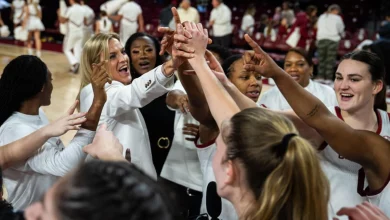Edmonton Oilers Aim to Bounce Back with Resilience and Maturity Following Game 3 Loss, Focusing on Strategic Adjustments and Mental Toughness to Regain Series Momentum and Overcome Deficit

Edmonton Oilers Aim to Bounce Back with Resilience and Maturity Following Game 3 Loss, Focusing on Strategic Adjustments and Mental Toughness to Regain Series Momentum and Overcome Deficit
In the high-stakes environment of NHL playoffs, every game is a test of a team’s resilience, tactical discipline, and mental toughness. The Edmonton Oilers, after suffering a decisive 6-1 defeat in Game 3 against the Florida Panthers, face an urgent need to regroup, recalibrate, and demonstrate the resilience and maturity required to turn the tide of the series.
The loss exposed vulnerabilities—defensive lapses, inconsistent offensive execution, and perhaps a psychological dip under pressure. However, it also offered an opportunity for growth, reflection, and strategic refinement. The Oilers now aim to leverage their resilience and maturity to respond effectively, making necessary adjustments both tactically and psychologically.
This comprehensive analysis will delve into the series’ context, lessons from Game 3, the importance of resilience and maturity, specific strategic adjustments, mental resilience strategies, and how Edmonton can set the tone for a potential comeback.
Series Context and the Significance of Game 3
Before analyzing the post-loss strategy, it’s essential to understand the series’ context. The Oilers entered the series as one of the league’s most potent offensive teams, led by Connor McDavid and Leon Draisaitl, with high expectations to dominate. Conversely, the Florida Panthers had been resilient, relying on disciplined defense, timely scoring, and goaltending.
The series was evenly poised after the first two games, with momentum swinging based on key moments. Game 3’s result—a 6-1 blowout—shifted the narrative, raising questions about the Oilers’ defensive discipline, consistency, and mental preparedness.
A loss of this magnitude can be demoralizing, but it also serves as a catalyst for reflection. The Oilers’ immediate challenge is to reset mentally, analyze what went wrong, and implement adjustments to prevent similar outcomes.
Lessons from Game 3: What Went Wrong?
Defensive Lapses and Breakdowns
One of the most glaring issues in Game 3 was defensive breakdowns. The Oilers’ defensive zone coverage appeared disorganized, allowing Florida’s forwards to find space and create scoring opportunities. Key mistakes included missed assignments, poor positional play, and turnovers in critical areas.
Goaltending Performance
While goaltending can’t shoulder all blame, Jack Campbell’s performance was underwhelming. Several goals were soft or poorly handled, which compounded defensive lapses and diminished team confidence.
Penalty Kill and Special Teams
Florida capitalized on power plays, scoring crucial goals that extended their lead. The Oilers’ penalty kill struggled with communication and execution, giving Florida multiple chances to capitalize.
Offensive Disconnection
Despite their reputation for offensive firepower, Edmonton’s top lines were stifled. They failed to generate sustained pressure or capitalize on scoring chances, partly due to Florida’s disciplined defense and physicality.
Psychological Impact
The magnitude of the defeat likely impacted players’ confidence, especially for leaders like McDavid and Draisaitl. Maintaining composure and mental resilience becomes vital after such setbacks.
The Importance of Resilience and Maturity
Resilience: Bouncing Back Stronger
Resilience is the ability to recover quickly from setbacks, maintain focus, and adapt under pressure. In the Stanley Cup playoffs, resilience distinguishes teams that endure adversity from those that succumb.
For the Oilers, resilience involves:
Maintaining confidence despite a tough loss
Staying mentally focused and avoiding panic
Learning from mistakes and making necessary adjustments
Supporting teammates and fostering a positive team environment
Maturity: Strategic and Emotional Discipline
Maturity encompasses strategic patience, emotional control, and leadership. Mature teams recognize that setbacks are part of the playoff journey and respond with discipline and strategic clarity.
For Edmonton, maturity means:
Avoiding frustration-driven penalties
Communicating effectively on the ice
Playing a disciplined, structured game
Trusting their training and game plan
Strategic Adjustments: What the Oilers Need to Do
To respond effectively after Game 3, Edmonton must make targeted adjustments. These involve tactical changes, lineup considerations, and game-day strategies.
Defensive Reorganization
Enhanced Defensive Structure: Implement tighter gap control, especially in neutral zones, to prevent Florida’s quick transitions and odd-man rushes.
Structured Zone Coverage: Emphasize proper positioning in the defensive zone, minimizing turnovers and giving goaltenders clearer sightlines.
Defensive Pairings: Reassess pairings to ensure stability and chemistry, possibly rotating players to find optimal combinations.
Penalty Kill Improvement
Aggressive Forechecking: Apply pressure on Florida’s power play units to disrupt their rhythm.
Clear Communication: Ensure penalty killers are aligned and aware of their responsibilities.
Selective Penalty Avoidance: Reduce unnecessary penalties to limit Florida’s power play opportunities.
Offensive Strategies
Sustained Puck Possession: Focus on maintaining puck control to limit Florida’s transition opportunities.
Cycle and Crash: Use cycling to create scoring chances in the offensive zone.
Rapid Transition Play: Exploit turnovers with quick counters to catch Florida’s defense off guard.
Lineup Adjustments
Line Tweaks: Consider lineup changes to spark offensive production or tighten defensive coverage. For example, adding a physical player or a defensive-minded forward to stabilize the third line.
Increased Ice Time for Leaders: Ensure Connor McDavid and Leon Draisaitl are on the ice in key moments, inspiring confidence and dictating pace.
Special Teams Focus
Power Play Recalibration: Adjust positioning and set plays to increase scoring chances.
Penalty Kill Discipline: Focus on disciplined defending and clear communication to prevent Florida from capitalizing on power plays.
Psychological Strategies: Building Resilience and Maturity
Mental Toughness Training
Visualization and Focus: Players should visualize successful plays and maintain focus on game objectives.
Breathing and Relaxation Techniques: Use to reduce anxiety and maintain composure during high-pressure moments.
Positive Reinforcement: Coaches and teammates should emphasize positive messaging to rebuild confidence.
Leadership and Team Culture
Veteran Leadership: Leaders like McDavid, Draisaitl, and veteran players must set the tone through their actions and words.
Supportive Environment: Foster a culture where mistakes are seen as learning opportunities, not failures.
Accountability: Encourage accountability at both individual and team levels.
Focus on Process, Not Just Outcomes
Emphasize the importance of executing the game plan rather than obsessing over the result.
Celebrate small successes during practice and games to rebuild confidence.
Broader Playoff Implications and Next Steps
The series’ momentum has shifted, but hockey is unpredictable. Edmonton’s response in upcoming games will determine whether they can leverage resilience and maturity to mount a comeback.
Key Areas to Monitor
Game 4 Performance: The team’s ability to start strong and maintain discipline.
Adjustments Execution: How well tactical changes are implemented and adapted as needed.
Psychological Resilience: The team’s mental toughness in facing adversity.
Leadership Impact: The influence of veteran players and coaching staff in rallying the team.
Strategic Focus Moving Forward
Focus on Defense First: Tighten defensive structures to limit Florida’s scoring chances.
Maintain Offensive Pressure: Use offensive talents to generate sustained attack and capitalize on scoring opportunities.
Stay Disciplined: Minimize penalties, avoid frustration, and stay focused on the game plan.
Build Confidence: Use positive reinforcement and small victories to regain momentum.
Turning the Tide with Resilience and Maturity
The Edmonton Oilers’ journey in this series is far from over. Their ability to respond to adversity with resilience and maturity will define their playoff fate. A single game does not determine a series, but a series can be won through collective mental strength, strategic discipline, and unwavering focus.
By analyzing their mistakes, making tactical adjustments, and fostering a resilient mindset, Edmonton can demonstrate that they possess the maturity required to overcome setbacks. The path forward requires patience, discipline, and a collective belief in their ability to turn the tide.
In the end, resilience isn’t just about bouncing back—it’s about learning, growing, and demonstrating the mental toughness to emerge stronger after every challenge. The Oilers have the talent; now they must show the character to rise above the setback, adapt, and fight for their playoff dreams.









